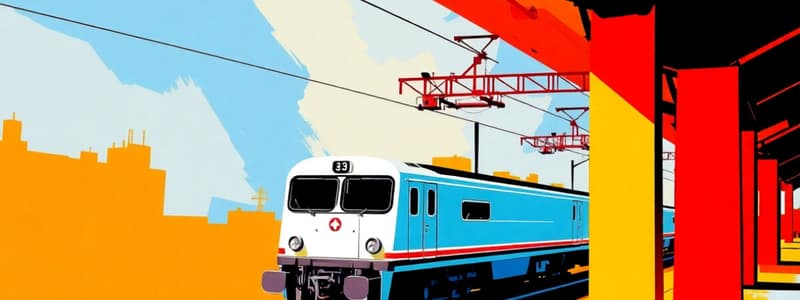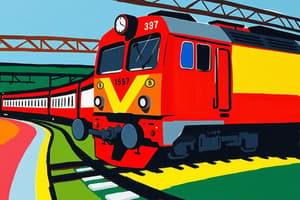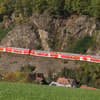Podcast
Questions and Answers
What is the maximum width of the AXI 1755 model as indicated?
What is the maximum width of the AXI 1755 model as indicated?
- 3660 mm
- 4.2 m
- 2.9 m
- 1755 mm (correct)
Which dimension is specifically mentioned in relation to the electrified stock?
Which dimension is specifically mentioned in relation to the electrified stock?
- LOA (correct)
- DIM
- EN
- MU
What is the meaning of the acronym LOA in this context?
What is the meaning of the acronym LOA in this context?
- Load Operating Area
- Length Of Approach
- Length Over Axles
- Length Overall (correct)
Which component appears to be related to the axles according to the provided information?
Which component appears to be related to the axles according to the provided information?
Which option indicates a specification related to 'MAX.WIDE ELECTRIFIED'?
Which option indicates a specification related to 'MAX.WIDE ELECTRIFIED'?
What is the minimum horizontal distance from the center of the track to any structure at a height of 300mm above rail level?
What is the minimum horizontal distance from the center of the track to any structure at a height of 300mm above rail level?
For structures positioned between 3355mm and 4115mm above rail level, what is the decreasing minimum horizontal distance required from the center of the track?
For structures positioned between 3355mm and 4115mm above rail level, what is the decreasing minimum horizontal distance required from the center of the track?
What is the minimum height above rail level for overhead tie bars in workshops where electric traction is not likely to be used?
What is the minimum height above rail level for overhead tie bars in workshops where electric traction is not likely to be used?
What is the minimum height above rail level for doorways in workshops when electric traction is likely to be used?
What is the minimum height above rail level for doorways in workshops when electric traction is likely to be used?
What is the minimum horizontal distance from the center of the track to any structure for heights from 4115mm to 6100mm above rail level?
What is the minimum horizontal distance from the center of the track to any structure for heights from 4115mm to 6100mm above rail level?
What additional clearance must be accounted for on running lines relative to goods platforms that are 1065mm above rail level?
What additional clearance must be accounted for on running lines relative to goods platforms that are 1065mm above rail level?
How much extra height must be added to the minimum required heights where electric traction is likely to be used, for every 12mm above 5410mm?
How much extra height must be added to the minimum required heights where electric traction is likely to be used, for every 12mm above 5410mm?
For tunnels and through girder bridges, what is the minimum horizontal distance required from the center of the track when the height is 4420mm above rail level?
For tunnels and through girder bridges, what is the minimum horizontal distance required from the center of the track when the height is 4420mm above rail level?
What is the maximum permissible speed estimated for cant deficiency value of 100mm?
What is the maximum permissible speed estimated for cant deficiency value of 100mm?
What should the clearance be between live conductors and earth for short-term conditions?
What should the clearance be between live conductors and earth for short-term conditions?
What is the maximum height of contact wire needed to assess clearance under an existing structure?
What is the maximum height of contact wire needed to assess clearance under an existing structure?
Which radius of curvature requires an extra clearance of 150 mm for new line/gauge conversion?
Which radius of curvature requires an extra clearance of 150 mm for new line/gauge conversion?
What is the minimum long-term clearance required from live conductors to earth?
What is the minimum long-term clearance required from live conductors to earth?
When locating permanent structures on curves, what is the considered maximum cant for future speed increases?
When locating permanent structures on curves, what is the considered maximum cant for future speed increases?
What factor is NOT explicitly required when determining the permissible height of the contact wire?
What factor is NOT explicitly required when determining the permissible height of the contact wire?
What is the vertical and lateral distance required for live conductors to ensure long-term safety clearance?
What is the vertical and lateral distance required for live conductors to ensure long-term safety clearance?
Which of the following is a required consideration for over-dimensional consignments?
Which of the following is a required consideration for over-dimensional consignments?
Under what conditions should short-term clearances be measured?
Under what conditions should short-term clearances be measured?
What is the minimum distance center to center of tracks when re-spacing existing lines?
What is the minimum distance center to center of tracks when re-spacing existing lines?
For new works, what dimension should be adopted as the standard minimum distance between centers of tracks?
For new works, what dimension should be adopted as the standard minimum distance between centers of tracks?
What does the dotted line in the diagram represent?
What does the dotted line in the diagram represent?
When the line is on a curve, what must be done regarding the horizontal distance of any structure?
When the line is on a curve, what must be done regarding the horizontal distance of any structure?
What is the minimum height dimension indicated in the notes for a clearance requirement?
What is the minimum height dimension indicated in the notes for a clearance requirement?
What is the significance of the dimension 4, 6, 10, 14 mentioned for 2020/CEDO/SD/IRSOD/O/ACS-30?
What is the significance of the dimension 4, 6, 10, 14 mentioned for 2020/CEDO/SD/IRSOD/O/ACS-30?
Which of the following is true about existing lines when seeking to avoid heavy alterations?
Which of the following is true about existing lines when seeking to avoid heavy alterations?
In the context provided, what does '9 15 Min' represent?
In the context provided, what does '9 15 Min' represent?
What is the primary focus of the dimensions and notes provided?
What is the primary focus of the dimensions and notes provided?
What aspect does the term 'standard dimensions' primarily address in this context?
What aspect does the term 'standard dimensions' primarily address in this context?
What is the maximum allowable height dimension specified for the contact wire above the rail level?
What is the maximum allowable height dimension specified for the contact wire above the rail level?
In the context of track design, when curves are involved, how should the horizontal distance be adjusted?
In the context of track design, when curves are involved, how should the horizontal distance be adjusted?
For which type of works are the specified dimensions of 4265 mm maximum applicable?
For which type of works are the specified dimensions of 4265 mm maximum applicable?
What is the relationship between the height of the contact wire and the super-elevation factor as described?
What is the relationship between the height of the contact wire and the super-elevation factor as described?
Which factor must be considered when determining the horizontal distance from the center of the track on curves?
Which factor must be considered when determining the horizontal distance from the center of the track on curves?
What implication does the note about dimensions being in millimetres have for interpretation?
What implication does the note about dimensions being in millimetres have for interpretation?
In the context provided, what does 'minimum height for continuous covering in passenger stations' likely refer to?
In the context provided, what does 'minimum height for continuous covering in passenger stations' likely refer to?
What is specifically mentioned about applying distances to straight track in the context?
What is specifically mentioned about applying distances to straight track in the context?
What is the maximum dimension specified for the indicated gauge in the context?
What is the maximum dimension specified for the indicated gauge in the context?
Why is it important to increase the horizontal distance by an amount 'D' only on curves?
Why is it important to increase the horizontal distance by an amount 'D' only on curves?
What does the note about standard dimensions most critically address?
What does the note about standard dimensions most critically address?
What is indicated about the dimensions in the context provided?
What is indicated about the dimensions in the context provided?
What should be done if an extension above 5410 mm is required?
What should be done if an extension above 5410 mm is required?
What does the abbreviation AXI likely relate to in the provided specifications?
What does the abbreviation AXI likely relate to in the provided specifications?
Which design consideration is essential for structures positioned at varying heights above rail level?
Which design consideration is essential for structures positioned at varying heights above rail level?
In the context of electrified stock, why is it necessary to specify the width?
In the context of electrified stock, why is it necessary to specify the width?
What consideration should be taken when planning structures around curves?
What consideration should be taken when planning structures around curves?
What is the significance of the dimension 3660 in the specifications?
What is the significance of the dimension 3660 in the specifications?
What is the revised minimum clearance provided between a platform on the outside of a curve and the ends of a vehicle?
What is the revised minimum clearance provided between a platform on the outside of a curve and the ends of a vehicle?
Which factor is NOT considered when calculating extra clearance on curves?
Which factor is NOT considered when calculating extra clearance on curves?
How much reduction is made on the permissible clearance inside a curve as per the revised guidelines?
How much reduction is made on the permissible clearance inside a curve as per the revised guidelines?
What was considered excessive in the 1922 schedule regarding curves?
What was considered excessive in the 1922 schedule regarding curves?
What adjustment is made to the clearance on straight platforms as opposed to curved platforms?
What adjustment is made to the clearance on straight platforms as opposed to curved platforms?
What is the maximum movement allowed due to lurching at the center of a vehicle compared to the ends?
What is the maximum movement allowed due to lurching at the center of a vehicle compared to the ends?
According to the revisions, what is one reason the clearance between platforms and footboards was deemed dangerous?
According to the revisions, what is one reason the clearance between platforms and footboards was deemed dangerous?
What constitutes the 'additional clearance' required on the inside of a curve?
What constitutes the 'additional clearance' required on the inside of a curve?
What is the minimum height where DC traction is likely to be used?
What is the minimum height where DC traction is likely to be used?
Which maximum value is indicated in relation to the height for a specific structure clarifying its usage?
Which maximum value is indicated in relation to the height for a specific structure clarifying its usage?
What is the significance of the dimension 610 in the provided standards?
What is the significance of the dimension 610 in the provided standards?
For which height must the distance from the center of the track be diminished due to curves?
For which height must the distance from the center of the track be diminished due to curves?
What factor must be taken into account for structures located on curves according to standards?
What factor must be taken into account for structures located on curves according to standards?
What vertical clearance is recommended to prevent contact wire interference in existing structures?
What vertical clearance is recommended to prevent contact wire interference in existing structures?
What dimension should be used for the standard minimum distance between tracks?
What dimension should be used for the standard minimum distance between tracks?
What is the maximum height for contact wire clearance indicated in the standards?
What is the maximum height for contact wire clearance indicated in the standards?
What additional height must be added where electric traction is likely to be utilized?
What additional height must be added where electric traction is likely to be utilized?
What is the minimum height required for overhead tie bars in workshops where electric traction is not likely to be used?
What is the minimum height required for overhead tie bars in workshops where electric traction is not likely to be used?
What factor is relevant for determining the adjustment of horizontal distances on curves according to the provided guidelines?
What factor is relevant for determining the adjustment of horizontal distances on curves according to the provided guidelines?
Which dimension must be assessed to determine the proper clearance above the rail level when electric traction is involved?
Which dimension must be assessed to determine the proper clearance above the rail level when electric traction is involved?
What does the formula D = H x S / G imply regarding height adjustments on curves?
What does the formula D = H x S / G imply regarding height adjustments on curves?
For structures situated above 3355 mm and below 4115 mm, what is the relationship of horizontal distance needed?
For structures situated above 3355 mm and below 4115 mm, what is the relationship of horizontal distance needed?
In terms of standard dimensions, what critical note is associated with straight tracks?
In terms of standard dimensions, what critical note is associated with straight tracks?
Which element must be taken into account for an extension above the specified heights in relation to electric traction?
Which element must be taken into account for an extension above the specified heights in relation to electric traction?
What minimum height for continuous coverage is implied for passenger stations?
What minimum height for continuous coverage is implied for passenger stations?
When considering existing works, what is a key implication of the provided dimensions?
When considering existing works, what is a key implication of the provided dimensions?
Why is it necessary to refer to specific minimum heights and distances in this context?
Why is it necessary to refer to specific minimum heights and distances in this context?
What is indicated about the dimensions specific to electrified lines in the provided content?
What is indicated about the dimensions specific to electrified lines in the provided content?
Which factor primarily affects the necessary clearance between the overhead wire and the structure?
Which factor primarily affects the necessary clearance between the overhead wire and the structure?
What is the minimum height of the contact wire required for a stock height of 4.42m?
What is the minimum height of the contact wire required for a stock height of 4.42m?
Which of the following factors is least likely to impact the required height of the contact wire?
Which of the following factors is least likely to impact the required height of the contact wire?
What additional allowance is made in height clearance for track maintenance?
What additional allowance is made in height clearance for track maintenance?
Which aspect would be important to consider when assessing the likelihood of diesel locomotives halting under a structure?
Which aspect would be important to consider when assessing the likelihood of diesel locomotives halting under a structure?
When the span length of overhead equipment is 49.5m or below, how much can the minimum height of the contact wire be reduced?
When the span length of overhead equipment is 49.5m or below, how much can the minimum height of the contact wire be reduced?
What clearance is required between the lowest portion of a structure and the overhead wire?
What clearance is required between the lowest portion of a structure and the overhead wire?
In evaluating the type of structure, which of the following is NOT mentioned?
In evaluating the type of structure, which of the following is NOT mentioned?
What is one of the factors to consider regarding the maximum number of electric locomotives per train?
What is one of the factors to consider regarding the maximum number of electric locomotives per train?
Which aspect least influences the determination of overhead equipment clearance?
Which aspect least influences the determination of overhead equipment clearance?
Flashcards are hidden until you start studying
Study Notes
Minimum Horizontal Distances for Structures
- The minimum horizontal distance from the center of the track to any structure varies based on height above rail level.
- From rail level to 305mm above rail level, the minimum distance is 1675mm.
- From 305mm to 3355mm above rail level, the minimum distance is 2135mm.
- From 3355mm to 4115mm above rail level, the distance decreases from 2135mm to 1980mm.
- From 4115mm to 6100mm above rail level, the minimum distance is 1370mm.
Minimum Heights for Overhead Structures
- For workshops and running sheds, the minimum height above rail level for overhead tie bars, girders, etc. depends on the use of electric traction.
- Where electric traction is not likely to be used, the minimum height is 5030mm.
- Where electric traction is likely to be used, the minimum height is 6176mm.
Minimum Doorway Heights
- The minimum height above rail level of doorways in workshops and running sheds is determined by the use of electric traction.
- For a doorway width of 1370mm on either side of the track center, where electric traction is not likely to be used, the minimum height is 4875mm.
- Where electric traction is likely to be used, the minimum height is 6176mm.
A.C. Traction Clearances
- For tunnels and through girder bridges with 25 kV, 50 cycles A.C. traction, the minimum horizontal distance from the center of the track to any structure is 2135mm, decreasing to 915mm from 4420mm to 5410mm above rail level.
- From 4115mm to 6100mm above rail level, the minimum horizontal distance is 1370mm.
Appendix Notes
- For goods platforms 1065mm above rail level that are not on a running line, a 25mm addition to the figures in column 5 of the Appendix is required.
- Where electric traction is likely to be used, add 1mm for every 12mm of height above 5410mm to the figures in column 7 of the Appendix up to the height where the conductor wires are likely to be fixed.
Clearances for New Lines
- For new lines, gauge conversions, and doubling, the minimum horizontal distance is 2575mm below rail level up to the formation level on straights and curves with radii of up to 875m.
- For curves with radii less than 875m, the minimum distance is 2725mm.
Maximum Speed and Cant Values
- The maximum permissible speed for cant deficiency values of 100mm and cant of 165mm.
- However, a maximum cant of 185mm may be assumed for locating permanent structures on the side of curves on new construction and doubling on Group A routes with potential for increased speed in the future.
Clearances for 25kV AC Electric Traction
- It is desirable to provide maximum possible clearances for lines equipped with 25kV AC 50 cycles single-phase electric traction.
- There are both short-term and long-term clearance requirements for live conductors and earth.
- Short-term clearances (brief periods) require a vertical and lateral distance of 200mm.
- Long-term clearances (which may remain for a sustained period) require a vertical and lateral distance of 250mm.
Determining Permissible Contact Wire Height
- To ensure sufficient clearance under existing structures, the permissible height of the contact wire must be determined.
- This requires information about the structure's profile, allowance for track slewing, low joints in the tracks, track curvature, super-elevation, maximum permissible speed, dimensions of over-dimensional consignments, location of the structure in relation to level crossings, water columns, and turnouts, and the type of overhead equipment.
Standard Dimensions for Tunnels & Through Girder Bridges
- Where the line is on a curve, the horizontal distance of any structure from the center of the adjacent track and the distance between track centers should be increased according to the Appendix.
- When re-spacing existing lines, the minimum distance center to center of tracks may be reduced from 4725mm to not less than 4495mm to avoid significant alterations to tunnels or bridges.
- The dimension of 4725mm is to be adopted for all new works.
Maximum Moving Dimensions
- The maximum moving dimensions for a track gauge of 1676mm are provided in the diagram.
- The dimensions include constraints for the side clearances of moving vehicles and the height of the vehicle.
Standard Dimensions in Stations
- The specified distances for stations only apply to straight tracks.
- On curves, the horizontal distance should be increased by an amount 'D' to account for the lean due to super-elevation.
- This adjustment is calculated using the formula: D = H x S / G, where H is the contact wire height, S is the super-elevation, and G is the track gauge, all dimensions in meters.
- The minimum height for a continuous covering in passenger stations is also provided.
- The diagram specifies dimensions for the maximum width of electrified stock and the maximum dimensions for existing and new construction.
Extra Clearance on Curves
- Extra clearance for curved tracks should be provided according to columns 5, 6, 7 and 8 instead of column 9.
- The appendix detailing extra clearance on curves has been revised to include maximum speeds, corresponding superelevation, and the required clearances.
Rationale for Revisions
- The clearance provided in the 1913 and 1922 schedules was considered too liberal, causing dangerous gaps between platforms and footboards.
- In the 1922 schedule, sway allowance for carriages was treated as an addition to existing clearance on straight tracks, not accounting for the additional sway on curved tracks.
- The amount of superelevation was also excessive on sharper curves.
Reduced Clearance on Curves
- The clearance between a vehicle (footboards) and the platform coping on a straight track is 152mm.
- To reduce the average distance between a curved platform and foot boards, the minimum clearance on the outside of a curve can be reduced to 127mm.
- The clearance between the center of a vehicle and the platform on the inside of a curve can be safely reduced to 102mm due to reduced lurching at the vehicle’s center.
- Therefore, extra allowances on curves in paragraphs 5, 6, 7, and 8 have been reduced by 51mm on the inside and 25mm on the outside of curves.
Considerations for Contact Wire Height
- The additional clearance on the inside of a curve must account for curvature, lean due to superelevation, and additional sway of vehicles over that already accounted for on straight tracks.
- The additional clearance on the outside of a curve must account for the effect of curvature.
- The clearance between the lowest portion of a bridge or structure and the topmost position of the overhead wire is determined using the following factors:
- System of tensioning of the overhead equipment
- Atmospheric conditions
- Maximum permissible number of electric locomotives per train
- Location of the structure in relation to points, crossings, overlaps, spans, etc.
- Length of the structure along the tracks
- Type of structure (girder, masonry, etc.)
- Span of overhead equipment under the bridge
- Presence of traction feeder
- Likelihood of diesel locomotives halting under the structure
Minimum Height of Contact Wire
- The minimum height of contact wire for stock height of 4.42m running on sections electrified with 25 kV A.C. traction system with live traction overhead equipment is 4.69m.
- This minimum height is determined by adding the height of the locomotive (4.42m), minimum clearance to contact wire (0.25m), and allowance for track maintenance (0.02m).
- For OHE span lengths of 49.5m or below, the oscillation of the contact wire is reduced to 0.05m, allowing for a reduced minimum height of the contact wire to 4.64m.
Standard Dimensions in Stations
- The distances specified in the standard dimensions for stations apply only to straight tracks.
- On curves, the horizontal distance should be increased by an amount 'D' calculated by the formula: D = H x S / G
- Where:
- H = Height of the contact wire (meters)
- S = Superelevation (meters)
- G = Gauge of the track (meters)
- Where:
- The minimum height for continuous covering in passenger stations depends on whether DC traction is in use or likely to be used.
- Detailed dimensions for the maximum moving dimensions and standard dimensions are provided in the diagrams.
Notes:
- All dimensions are in millimeters unless otherwise specified.
- Existing works are indicated with an asterisk (*).
- New works or alterations to existing works are indicated with a double hyphen (--).
Studying That Suits You
Use AI to generate personalized quizzes and flashcards to suit your learning preferences.





